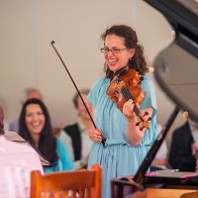Music can be wondrous and intoxicating.
For performers, though, sometimes it’s easy to become embroiled in the details of an everyday existence of performing and practising: Why can’t I get all these notes? I practised them last week…This conductor really should give it up! What shall I have for lunch? This rehearsal is too long! And my arm is tired…
Then we are reminded, once again, of the profound effect that music has.
I have experienced many of these humbling moments at our Straddie festival. These are moments I don’t forget, no matter how small they seem.
Some of the time we have spent with the kids at the Dunwich State School has inspired me the most. l always remember the little wide-eyed girl, who, after listening to us play a Mendelssohn quartet (and upon prompting her to tell us how it made her feel), said it was ‘like a giant house made of gold, filled with swirly colours!’
Sometimes I wish we could pare back our years so that we could feel that raw reaction we had to music as children. Perhaps it really is just a decision we made, somewhere along the line (is it undo-able?), to almost encourage ourselves not to let our emotions and imaginations get the better of us. We need children like this little girl to remind us what that feeling was, and to help us learn to nurture it again.
Music needs to be part of children’s lives, if not only for the simple reason that it makes them into better adults. It opens a child’s mind to wonder and a whole world of beauty and fantasy.
On a less grand scale, music can begin by improving someone’s day, even if it’s just for a moment…The fact is, music changes people. Is that a cliché? Perhaps, but a well deserved one. Music creates more compassionate humans, calms disturbed minds, triggers empathy. It has an infinite capacity to spark a long forgotten emotion or memory: a private, emotional experience that no-one else can tamper with.
We need music: to heal, for people to experience joy, belonging and hope.

